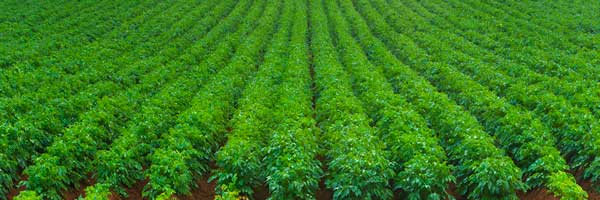How potatoes could become ‘sun worshippers’
If there’s one thing potato plants don’t like, it’s heat. If the temperature is too high, potato plants form significantly lower numbers of tubers or sometimes none at all. Biochemists at Friedrich-Alexander-Universität Erlangen-Nürnberg (FAU) have now discovered the reason why. If the temperature rises, a so-called small RNA blocks the formation of tubers. The scientists have now successfully switched off this small RNA and have produced potato plants that are more resistant to high temperatures, which is an important contribution to securing crop yields in the future in view of climate change. They have now presented their results in the journal Current Biology published by Cell Press.
Along with maize, rice, wheat and cassava, potatoes are one of the most important staple foods worldwide. The highest yields can be gained at moderate temperatures, which means around 21 degrees centigrade during the day and 18 degrees at night. At these temperatures and at the correct day length, a protein that induces the formation of tubers called SELF-PRUNING 6A (SP6A) is formed. This triggers tuber formation in the plant to prepare it for colder periods. However, if the temperature is very warm, as is the case in the laboratory led by Prof. Dr. Uwe Sonnewald’s team at FAU, who set the temperature to 29 degrees during the day and 27 degrees at night, the plants switch to a kind of growth programme where they form more green shoots and leaves and hardly any or no tubers. In addition, the few tubers that are formed contain less starch and germinate more quickly, which means they are not as nutritious and rot more quickly.
‘Up to now, the mechanism that prevents tuberisation at high temperatures was not known’, explains Prof. Dr. Uwe Sonnewald, Chair of Biochemistry at FAU. With his team of researchers, Prof. Dr. Sonnewald has now discovered a small RNA that comprises around 19 nucleotides and that regulates tuber formation depending on temperature. The RNA is inactive at low temperatures. If temperatures rise, it blocks the formation of SP6A and thus the formation of tubers.
In the second phase, the scientists created potato plants in which the effect of the small RNA was deactivated and exposed the plants to high temperatures in the greenhouse. The result was that these plants continued to produce good quality tubers even at temperatures of over 29 degrees during the day or 27 degrees at night. ‘Our results offer us the means of still being able to grow potatoes in future at increasing temperatures’, says Prof. Dr. Sonnewald. The next step for the researchers is testing the potato plants under field conditions to see whether they can withstand high temperatures in realistic conditions.
Company Profile
Adhering to the principle of managing scientifically and honesty and credit,our factory has passed ISO9001-2000 quality system certification. Now, Our factory can provide potato dry cleaning machine, automatic potato washing peeling machine, potato peeling machine, french fries sticks cutting machine, potato grader, potato cleaning and sorting machine, potato chips production line, french fries production line, frozen french fries production line, wave shape french fries production line, potato starch production line, potato mesh bag packing machine, potato dosing packing machine.
Our potato processing products have passed with CE,ISO and SGS Certificates and has been widely sold all over the world


